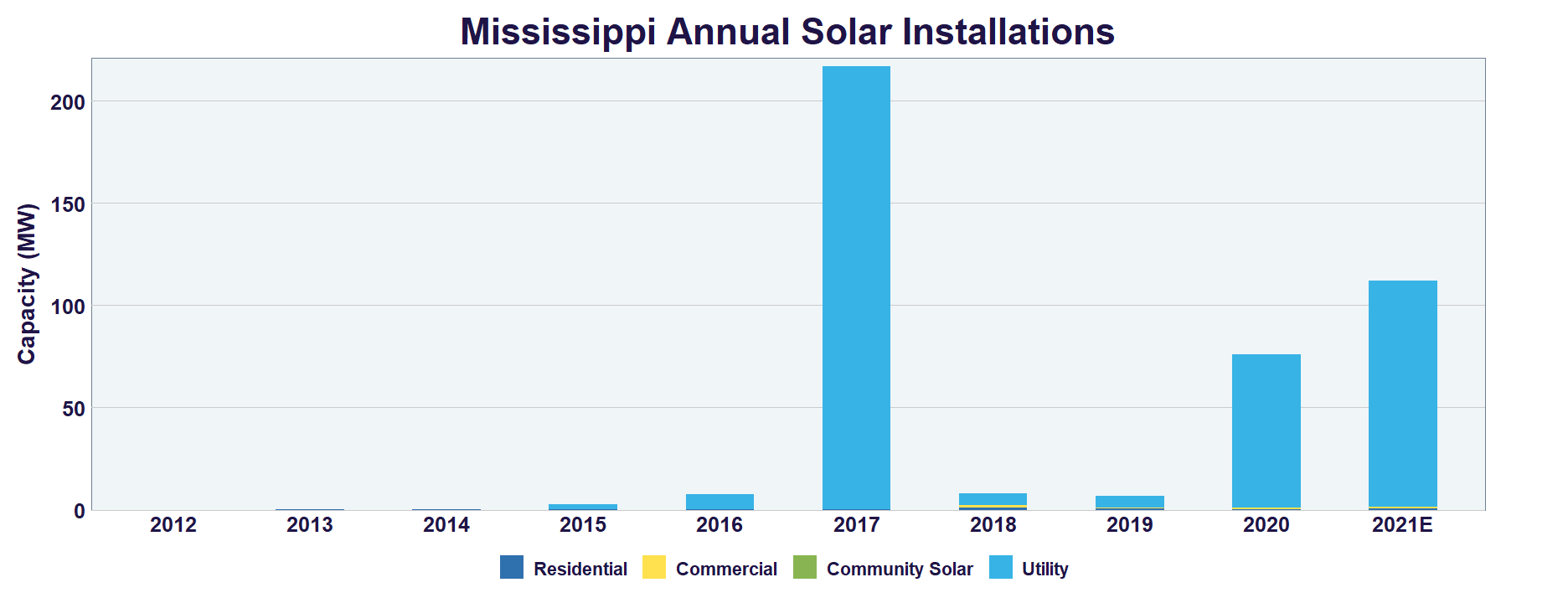The Mississippi Public Service Commission (PSC) has released its updated Net Metering and Interconnection Rules with policies that look to increase solar adoption across the board, while also improving access to solar for low- and middle-income (LMI) residents.
The PSC chose not to raise the base net metering rate to full retail electricity rates, as some advocates had asked for, keeping the rate at 2.5 cents/kWh over the deemed ‘avoided cost’ of solar. In this sense, avoided cost refers to the difference between the cost of solar generated by a rooftop and the cost of the utility procuring that energy from a different generation facility.
The commission did, however, create a 2 cents/kWh adder for customers who are at or below 250% of the federal poverty line for any solar they choose to export, and this adder comes with no customer nor capacity limit.
According to the ruling, the PSC believes that the adder “will meaningfully enhance both access to and the adoption of distributed generation by the currently underrepresented low-income segment of customers.”
Low- and middle-income customers are typically dissuaded from installing solar due to the high upfront costs, rather than by low export rates that increase payback times, however, this is a factor that the commission addressed later in the ruling.
The new net metering rules also include a requirement that each of the state’s investor-owned utilities offer a one-time $3,000.00 upfront cash rebate to any retail residential customer purchasing a renewable distributed energy project sized between 3 kW and 6 kW that is used, at least in part, for self-supply.
The PSC hopes that increasing access to solar across the board will attract more of the state’s residents to solar, a proposition that has not been particularly attractive to them historically. Of the 319 MW of solar that Mississippi has installed to date, according to data from the Solar Energy Industries Association (SEIA) and Wood Mackenzie, an absolutely miniscule amount has been from residential and commercial rooftop installations, so little that the two hardly appear on the state’s annual installed capacity graphs.

Still holding reservations regarding the base net metering rate, SEIA’s Southeast Regional Director, Will Giese, commended the ruling in an official statement, saying,
“While we are disappointed that the Public Service Commission did not offer the full retail rate for net metering, the order will move Mississippi’s solar policy forward, and SEIA will continue to advocate for straightforward and smart policies that grow the solar industry. As we’ve seen in Arkansas, easy-to-understand net metering programs can encourage rooftop solar adoption and provide benefits to all ratepayers.”
Giese also expects that the low-income net metering adder will help even more Mississippians experience the cost-saving benefits of solar energy.
Even though the scope of the decision only applied to net-metered systems, the PSC clarified that it plans to establish a separate rulemaking proceeding to consider rules and standards applicable to community solar.
This content is protected by copyright and may not be reused. If you want to cooperate with us and would like to reuse some of our content, please contact: editors@pv-magazine.com.









By submitting this form you agree to pv magazine using your data for the purposes of publishing your comment.
Your personal data will only be disclosed or otherwise transmitted to third parties for the purposes of spam filtering or if this is necessary for technical maintenance of the website. Any other transfer to third parties will not take place unless this is justified on the basis of applicable data protection regulations or if pv magazine is legally obliged to do so.
You may revoke this consent at any time with effect for the future, in which case your personal data will be deleted immediately. Otherwise, your data will be deleted if pv magazine has processed your request or the purpose of data storage is fulfilled.
Further information on data privacy can be found in our Data Protection Policy.